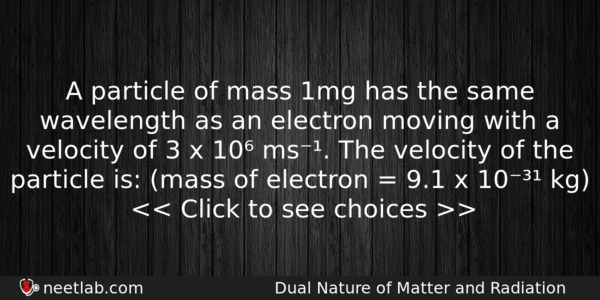| ⇦ | 
| ⇨ |
A particle of mass 1mg has the same wavelength as an electron moving with a velocity of 3 x 10⁶ ms⁻¹. The velocity of the particle is: (mass of electron = 9.1 x 10⁻³¹ kg)
Options
(a) 2.7 x 10⁻¹⁸ ms⁻¹
(b) 9 x 10⁻² ms⁻¹
(c) 3 x 10⁻³¹ ms⁻¹
(d) 2.7 x 10⁻²¹ ms⁻¹
Correct Answer:
2.7 x 10⁻²¹ ms⁻¹
Explanation:
Wavelength of particle (λ₁)
= h/mv = h / (1 x 10⁻³) x v
where v is the velocity of the particle. Wavelength of electron
(λ₂) = h / (9.1 x 10⁻³¹) x (3 x 10⁶)
But λ₁ = λ₂
h / (1 x 10⁻³) x v = h / (9.1 x 10⁻³¹) x (3 x 10⁶)
v = (9.1 x 10⁻³¹) x (3 x 10⁶) / 10⁻³
= 2.7 x 10⁻²¹ ms⁻¹
Related Questions: - Zenor diode is used for
- Heat is flowing through a rod of length 50 cm and area of cross-section 5 cm².
- Curie is the unit of
- In case of linearly polarised light, the magnitude of the electric field vector
- A charge of 40 µC is given to a capacitor having capacitance C=10 µF
Topics: Dual Nature of Matter and Radiation
(150)
Subject: Physics
(2479)
Important MCQs Based on Medical Entrance Examinations To Improve Your NEET Score
- Zenor diode is used for
- Heat is flowing through a rod of length 50 cm and area of cross-section 5 cm².
- Curie is the unit of
- In case of linearly polarised light, the magnitude of the electric field vector
- A charge of 40 µC is given to a capacitor having capacitance C=10 µF
Topics: Dual Nature of Matter and Radiation (150)
Subject: Physics (2479)
Important MCQs Based on Medical Entrance Examinations To Improve Your NEET Score
18000+ students are using NEETLab to improve their score. What about you?
Solve Previous Year MCQs, Mock Tests, Topicwise Practice Tests, Identify Weak Topics, Formula Flash cards and much more is available in NEETLab Android App to improve your NEET score.
Share this page with your friends

Leave a Reply